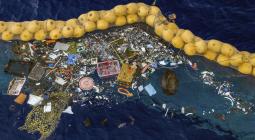The women taking the plastic out of periods.

Sanitary products litter Europe’s beaches, and 200,000 tonnes a year end up in UK landfill. Meet the people fighting for ‘environmenstrual’ alternatives.
Ella Daish has lost count of how many tampon pictures she has. People send them in from all over the world – plastic applicators polluting the environment, blue, orange, green, purple and yellow.
“That’s a rainbow of plastic pollution,” says Daish, 27, a campaigner seeking to persuade companies and governments to remove plastics from women’s sanitary products. “This is a global issue, but period products aren’t talked about much; they need to be stopped at source.”
Sanitary products are the fifth most common item found on Europe’s beaches, more widespread than single-use coffee cups, cutlery or straws. Some 200,000 tonnes of material is believed to end up in UK landfill every year. The water engineer Hazem Gouda has estimated that 700,000 panty liners, 2.5m tampons and 1.4m sanitary towels are flushed down the toilet every day in the UK.
Daish is neither the first nor the only woman taking a stand against this. But, finally, there are signs that the government and the retail industry are taking the problem seriously. Last month, Sainsbury’s became the first company to stop producing plastic applicators for its own-brand tampons, removing 2.7 tonnes of plastic annually. “This move shows that people power has a huge impact. It speaks volumes,” says Daish, who is putting pressure on other big names, including Procter & Gamble and Boots. “Plastic tampon applicators are used for seconds, yet take centuries to break down, and they have avoidable impacts on the environment.”
The Scottish government has also taken a stand, with a £175,200 campaign in partnership with Zero Waste Scotland to encourage women to try free samples of period pants, menstrual cups and reusable sanitary pads. In Wales, Caerphilly council has taken the decision to devote all of its period poverty funding to eco-friendly products – a UK first.
Alternatives are starting to catch on: there are products with cardboard applicators, as well as reusable versions and non-applicator tampons. Another option is the silicone menstrual cup that is inserted into the vagina to collect blood flow. Menstrual cups can be used for 10 years and cost about £20 – that equates to 16p for each menstrual cycle.
But there is still a lack of information comparing sanitary products. “Despite the fact that 1.9 billion women globally are of menstruating age, spending on average 65 days a year dealing with menstrual blood flow, few good-quality studies exist that compare sanitary products,” says Prof Penelope Phillips-Howard from the Liverpool School of Tropical Medicine, and the lead author of research on the subject, published in the Lancet Public Health.
Over 10 years, a menstrual cup is estimated to create 0.4% of the plastic waste generated by single-use pads and 6% of that produced by using tampons. “Menstrual cups will contribute to decreasing pollution of plastic waste from monthly use of disposable sanitary products,” adds Phillips-Howard who found that awareness about cups was extremely low, even though 199 brands are available in 99 countries.
The Women’s Environment Network (WEN), which coined the term “environmenstrual” in 2004, is noticing real momentum for change in the UK.
“After Blue Planet II, people realised the sheer scale of plastic pollution in our seas, our soil and our own bodies. Women seem happier to talk about periods … they had previously been seen as taboo,” says Kate Metcalf, WEN’s co-director. “We’ve still got a long way to go, but it’s becoming more mainstream and the Women’s Institute just joined our coalition, so our reach is spreading.”
According to Metcalf, period education is “patchy and outdated”. WEN is collaborating with the UK-based nonprofit group City to Sea, which campaigns to prevent plastic pollution at source, to create a schools programme called Rethink Periods. It is training 600 teachers across England to get the message across to adolescents. Crucially, says the campaign’s national coordinator Clare Marshall, lessons are accompanied by a free box of period pants, menstrual cups, organic cotton disposables and reusable pads, so that pupils can see and feel the products. “Girls and boys are often shocked to find out that certain products contain plastic,” Marshall says. “They are keen to find out what they can do, so we highlight how Ella Daish is successfully taking on the big guns; hopefully teenagers will listen up.”
Alec Mills, the co-founder of Dame, a company that produces the world’s first reusable tampon applicator, says the onus is on government to provide sustainable menstrual products in schools. “There’s a perfect storm of cultural change – people are more prepared to talk about their periods, plus there’s this enormous plastic-free environmental drive,” he says. “Finally, women are questioning the products they are using – now is the time to create positive changes and let the concrete set on a young generation making new habits.”
But there is concern about the Westminster government’s new Period Poverty Taskforce, co-chaired by Procter & Gamble which already supplies free Always pads and Tampax tampons to school pupils.
“Our calculations show that it would be cheaper in the long term for government to promote reusables and plastic-free alternatives,” says Ruby Raut, the founder of Wuka period pants, which can be worn for up to eight hours and then washed. “This is simply not in line with the government’s call for all schools to become plastic-free by 2022.”
Raut, Mills and Daish joined others to sign an open letter demanding that the Department for Education offers free sustainable alternatives to girls in English secondary education. The winner of the tender to provide free sanitary products in schools is due to be announced imminently, and campaigners want to see a substantial commitment to plastic-free products.
The concept of plastic-free periods is nothing new. Susie Hewson founded Natracare in 1989, producing plastic-free, organic cotton tampons and pads that are home-compostable. “We won’t compromise on the materials we use or how they are sourced, but for big brands developing new markets, in India, for example, plastic is cheap to produce and light to distribute,” she says.
Hewson adds: “The damage from our throwaway culture and unfettered growth is accumulating somewhere – there are consequences for everything we do.” She is calling for full disclosure of ingredients on product packaging to be a legal requirement. “Legislation is the biggest innovator – there’s a pressing need to reduce how much plastic we stick down the toilet.” Daish agrees: “We should know exactly what is in the products we put in and around such an intimate area of our bodies for extended periods of time; I wouldn’t put a plastic bag down there, I’m sure a lot of people wouldn’t – it’s a human rights issue.” Her goal is for all period products to become plastic-free: “We can all make a difference and change our habits – I just want to keep pushing for change.”
This article is part of a series on possible solutions to some of the world’s most stubborn problems. What else should we cover? Email us attheupside@theguardian.com. The WEN’s Environmenstrual festival (£15) is on 16 October, from 6pm to 10pm at Amnesty International UK in London. It is part of a week of action running from 12 to 19 October. Further information: wen.org.uk
2 October 2019
The Guardian




